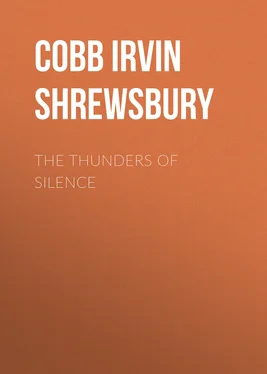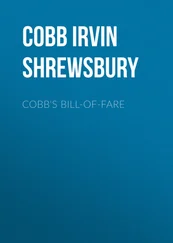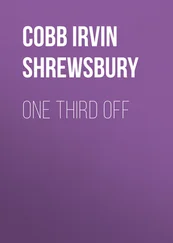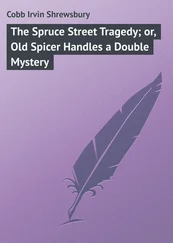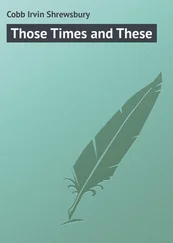Irvin Cobb - The Thunders of Silence
Здесь есть возможность читать онлайн «Irvin Cobb - The Thunders of Silence» — ознакомительный отрывок электронной книги совершенно бесплатно, а после прочтения отрывка купить полную версию. В некоторых случаях можно слушать аудио, скачать через торрент в формате fb2 и присутствует краткое содержание. Жанр: foreign_prose, foreign_antique, на английском языке. Описание произведения, (предисловие) а так же отзывы посетителей доступны на портале библиотеки ЛибКат.
- Название:The Thunders of Silence
- Автор:
- Жанр:
- Год:неизвестен
- ISBN:нет данных
- Рейтинг книги:5 / 5. Голосов: 1
-
Избранное:Добавить в избранное
- Отзывы:
-
Ваша оценка:
- 100
- 1
- 2
- 3
- 4
- 5
The Thunders of Silence: краткое содержание, описание и аннотация
Предлагаем к чтению аннотацию, описание, краткое содержание или предисловие (зависит от того, что написал сам автор книги «The Thunders of Silence»). Если вы не нашли необходимую информацию о книге — напишите в комментариях, мы постараемся отыскать её.
The Thunders of Silence — читать онлайн ознакомительный отрывок
Ниже представлен текст книги, разбитый по страницам. Система сохранения места последней прочитанной страницы, позволяет с удобством читать онлайн бесплатно книгу «The Thunders of Silence», без необходимости каждый раз заново искать на чём Вы остановились. Поставьте закладку, и сможете в любой момент перейти на страницу, на которой закончили чтение.
Интервал:
Закладка:
Irvin S. Cobb
The Thunders of Silence
The Thunders of Silence
Some people said Congressman Mallard had gone mad. These were his friends, striving out of the goodness of their hearts to put the best face on what at best was a lamentable situation. Some said he was a traitor to his country. These were his enemies, personal, political and journalistic. Some called him a patriot who put humanity above nationality, a new John the Baptist come out of the wilderness to preach a sobering doctrine of world-peace to a world made drunk on war. And these were his followers. Of the first—his friends—there were not many left. Of the second group there were millions that multiplied themselves. Of the third there had been at the outset but a timorous and furtive few, and they mostly men and women who spoke English, if they spoke it at all, with the halting speech and the twisted idiom that betrayed their foreign birth; being persons who found it entirely consistent to applaud the preachment of planetic disarmament out of one side of their mouths, and out of the other side of their mouths to pray for the success at arms of the War Lord whose hand had shoved the universe over the rim of the chasm. But each passing day now saw them increasing in number and in audacity. Taking courage to themselves from the courage of their apostle, these, his disciples, were beginning to shout from the housetops what once they had only dared whisper beneath the eaves. Disloyalty no longer smouldered; it was blazing up. It crackled, and threw off firebrands.
Of all those who sat in judgment upon the acts and the utterances of the man—and this classification would include every articulate creature in the United States who was old enough to be reasonable—or unreasonable—only a handful had the right diagnosis for the case. Here and there were to be found men who knew he was neither crazed nor inspired; and quite rightly they put no credence in the charge that he had sold himself for pieces of silver to the enemy of his own nation. They knew what ailed the Honourable Jason Mallard—that he was a victim of a strangulated ambition, of an egotistic hernia. He was hopelessly ruptured in his vanity. All his life he had lived on love of notoriety, and by that same perverted passion he was being eaten up. Once he had diligently besought the confidence and the affections of a majority of his fellow citizens; now he seemed bent upon consolidating their hate for him into a common flood and laving himself in it. Well, if such was his wish he was having it; there was no denying that.
In the prime of his life, before he was fifty, it had seemed that almost for the asking the presidency might have been his. He had been born right, as the saying goes, and bred right, to make suitable presidential timber. He came of fine clean blends of blood. His father had been a descendant of Norman-English folk who settled in Maryland before the Revolution; the family name had originally been Maillard, afterward corrupted into Mallard. His mother's people were Scotch-Irish immigrants of the types that carved out their homesteads with axes on the spiny haunches of the Cumberlands. In the Civil War his father had fought for the Union, in a regiment of borderers; two of his uncles had been partisan rangers on the side of the Confederacy. If he was a trifle young to be of that generation of public men who were born in unchinked log cabins of the wilderness or prairie-sod shanties, at least he was to enjoy the subsequent political advantage of having come into the world in a two-room house of unpainted pine slabs on the sloped withers of a mountain in East Tennessee. As a child he had been taken by his parents to one of the states which are called pivotal states. There he had grown up—farm boy first, teacher of a district school, self-taught lawyer, county attorney, state legislator, governor, congressman for five terms, a floor leader of his party—so that by ancestry and environment, by the ethics of political expediency and political geography, by his own record and by the traditions of the time, he was formed to make an acceptable presidential aspirant.
In person he was most admirably adapted for the rôle of statesman. He had a figure fit to set off a toga, a brow that might have worn a crown with dignity. As an orator he had no equal in Congress or, for that matter, out of it. He was a burning mountain of eloquence, a veritable human Vesuvius from whom, at will, flowed rhetoric or invective, satire or sentiment, as lava might flow from a living volcano. His mind spawned sonorous phrases as a roe shad spawns eggs. He was in all outward regards a shape of a man to catch the eye, with a voice to cajole the senses as with music of bugles, and an oratory to inspire. Moreover, the destiny which shaped his ends had mercifully denied him that which is a boon to common men but a curse to public men. Jason Mallard was without a sense of humour. He never laughed at others; he never laughed at himself. Certain of our public leaders have before now fallen into the woful error of doing one or both of these things. Wherefore they were forever after called humourists—and ruined. When they said anything serious their friends took it humorously, and when they said anything humorously their enemies took it seriously. But Congressman Mallard was safe enough there.
Being what he was—a handsome bundle of selfishness, coated over with a fine gloss of seeming humility, a creature whose every instinct was richly mulched in self-conceit and yet one who simulated a deep devotion for mankind at large—he couldn't make either of these mistakes.
Upon a time the presidential nomination of his party—the dominant party, too—had been almost within his grasp. That made his losing it all the more bitter. Thereafter he became an obstructionist, a fighter outside of the lines of his own party and not within the lines of the opposing party, a leader of the elements of national discontent and national discord, a mouthpiece for all those who would tear down the pillars of the temple because they dislike its present tenants. Once he had courted popularity; presently—this coming after his re-election to a sixth term—he went out of his way to win unpopularity. His invectives ate in like corrosives, his metaphors bit like adders. Always he had been like a sponge to sop up adulation; now he was to prove that when it came to withstanding denunciation his hide was the hide of a rhino.
This war came along, and after more than two years of it came our entry into it. For the most part, in the national capital and out of it, artificial lines of partisan division were wiped out under a tidal wave of patriotism. So far as the generality of Americans were concerned, they for the time being were neither Democrats nor Republicans; neither were they Socialists nor Independents nor Prohibitionists. For the duration of the war they were Americans, actuated by a common purpose and stirred by a common danger. Afterward they might be, politically speaking, whatever they chose to be, but for the time being they were just Americans. Into this unique condition Jason Mallard projected himself, an upstanding reef of opposition to break the fine continuity of a mighty ground swell of national unity and national harmony.
Brilliant, formidable, resourceful, seemingly invulnerable, armoured in apparent disdain for the contempt and the indignation of the masses of the citizenship, he fought against and voted against the breaking off of diplomatic relations with Germany; fought against the draft, fought against the war appropriations, fought against the plans for a bigger navy, the plans for a great army; fought the first Liberty Loan and the second; he fought, in December last, against a declaration of war with Austro-Hungary. And, so far as the members of Congress were concerned, he fought practically single-handed.
Читать дальшеИнтервал:
Закладка:
Похожие книги на «The Thunders of Silence»
Представляем Вашему вниманию похожие книги на «The Thunders of Silence» списком для выбора. Мы отобрали схожую по названию и смыслу литературу в надежде предоставить читателям больше вариантов отыскать новые, интересные, ещё непрочитанные произведения.
Обсуждение, отзывы о книге «The Thunders of Silence» и просто собственные мнения читателей. Оставьте ваши комментарии, напишите, что Вы думаете о произведении, его смысле или главных героях. Укажите что конкретно понравилось, а что нет, и почему Вы так считаете.
